Developing applications for the enterprise market comes with its own set of unique challenges. For example, these apps must be able to handle a lot of data, work with other systems, and meet high standards for security and reliability. Let's look at some of the fundamental problems developers face when making applications for the enterprise market and see how they solve them.
Enterprise mobile application development differs from regular software development regarding the project's size, business goals, the number of people working, and the system's complexity. Unlike casual development, enterprise app development requires a larger team and a longer development cycle. It is made to fit a business's specific needs and work with other enterprise systems. Casual software development, on the other hand, focuses on creating software that anyone can use and doesn't require a lot of integration with other systems.
Challenges Faced When Developing Mobile Apps for the Enterprise Market
Building apps for large businesses and corporations can be complex because they have complicated IT systems and many users. But if you take the proper steps and have the right mindset, you can get past these problems and make software solutions that streamline business processes, boost productivity, and drive growth. The enterprise market presents key features for mobile app development:
- Scalability. The sheer size and complexity of the enterprise challenge ensure that the apps can handle large volumes of data and traffic appearing due to business growth. As a result, enterprise applications need to be scalable, which means they need to handle increased usage without compromising performance. To overcome this challenge, developers must design applications with scalability in mind from the beginning. It can include using distributed architectures, caching strategies, and load-balancing techniques.
- Security. Another challenge is that enterprises are usually risk-averse, so apps must be extremely stable and highly secure to protect sensitive data and prevent unauthorized access. Developers should be familiar with industry-standard security practices and incorporate them into their applications. It can include implementing encryption, access control, and audit logging.
- Integration. Another major challenge when developing enterprise applications is integration with existing systems. Many enterprises have invested in various software and hardware solutions, and applications must integrate seamlessly with these systems. You can achieve it through the use of APIs, web services, and other integration technologies;
- Reliability. Enterprise applications need to be highly reliable and available at all times. Downtime can be costly for businesses and lead to lost revenue and productivity. Developers need to design applications with high availability in mind, which can include using redundant systems, implementing failover mechanisms, and conducting regular testing and maintenance.
- Compliance. Enterprise applications must comply with various regulations and standards, such as HIPAA, GDPR, and PCI-DSS. The developing team should know these regulations and ensure their applications meet the required standards. It can involve implementing specific security measures and conducting regular audits to ensure compliance.
- Competition. There are a lot of outstanding brands on the web market, and it can take time and effort to differentiate your app from the rest, enhance user interaction and automate business processes.
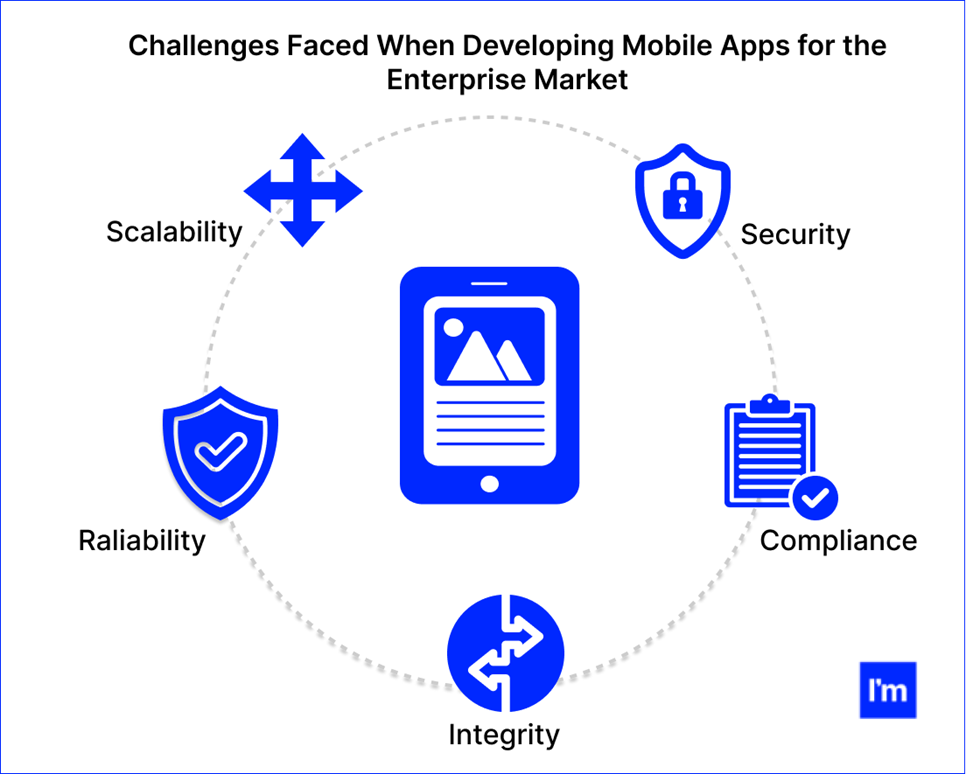
What Tools and Technologies Developers Use in Enterprise Application Development
Enterprise application development involves building complex and scalable software systems that support the operations of enterprises. Developers use various tools and technologies to design, develop, deploy, and maintain these applications.
Here are some of the tools and technologies commonly used in enterprise application development:
- Programming languages (PL) and frameworks. Developers use programming languages like Java, Python, C#, and JavaScript to write the code for enterprise applications. Each language has strengths and weaknesses, and developers choose it based on the application's requirements.
Choosing the right framework for your web product can be a critical decision. A framework is the foundation of your web product. It determines how it will be built, maintained, and expanded. If you choose the right framework, your web product will be scalable, fast, and safe. In contrast, the wrong choice can lead to performance issues, security vulnerabilities, and other problems. Frameworks give developers ready-made libraries and components that make it easier to create complex enterprise apps. Check the most popular backend frameworks between 2012-2023.
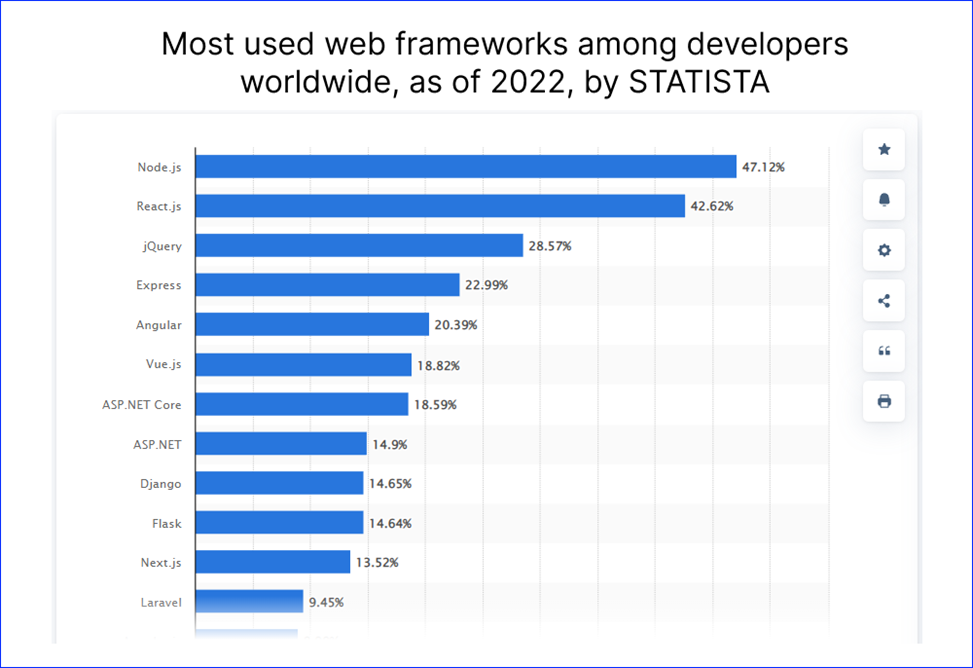
Most used web frameworks among developers worldwide, as of 2022 by STATISTA
- Artificial Intelligence and Machine Learning. AI and ML are among the most fantastic emerging technologies in enterprise application development. They will undoubtedly revolutionize businesses' operations, enhancing their productivity and customer experience. AI and ML let companies automate routine tasks, look at vast amounts of real-time data, and gain insights that would be impossible to get any other way.
AI and ML also help build predictive models that let businesses identify patterns, trends, and anomalies in their data, leading to better decision-making processes. In addition, they help make chatbots, virtual assistants, and voice assistants that customers can use to get help and talk to the company.
- Internet of Things (IoT) and Smart Devices. The IoT and smart devices have transformed the way we interact with the world around us. They've helped businesses to connect with their customers in new and exciting ways. In addition, it has given enterprise application development a whole new set of options. The IoT and smart devices allow businesses to collect data from various sources, including sensors, wearables, and smart home devices. They give companies information in real-time, which helps them make the decision-making process flexible and automate routine work.
- Cloud Computing and Serverless Architecture. We mention here vital new technologies for building business apps. They give businesses access to computing resources on-demand, making it easy to scale their applications to handle high traffic loads. Cloud computing and serverless architecture also lower infrastructure costs, improve application security and boost performance.
It also helps build modular microservices-based applications, reducing time to market.
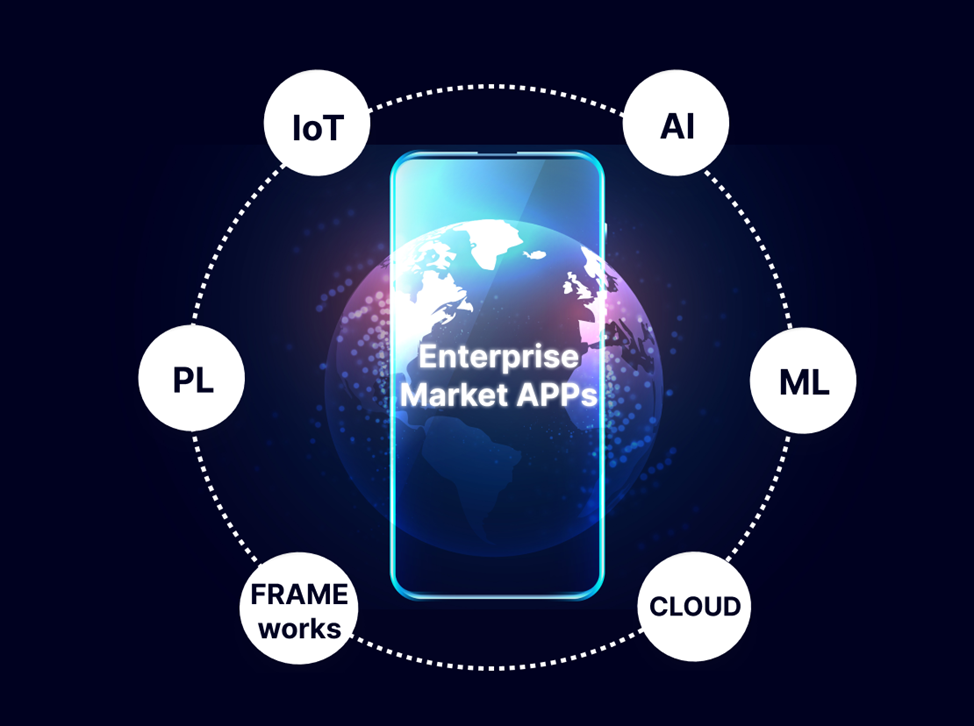
Opportunities and Challenges of enterprise application development
As businesses continue to digitize their operations, enterprise application development presents challenges and opportunities for businesses. To overcome these difficulties, enterprises need to invest in recruiting and retaining skilled developers, fostering collaboration and communication, keeping up with technology trends, and exploring opportunities for innovation and growth:
1. Recruitment and retention of skilled developers
With the growing demand for experienced developers, businesses
need help attracting and retaining top talent. You must offer competitive compensation packages, training opportunities, and a supportive work environment to manage the challenge.
2. Collaboration and communication with stakeholders
Building enterprise applications requires collaboration between IT, marketing, finance, and human resources departments. Effective communication and collaboration are crucial to ensure everyone is on the same page and the project is completed on time and within budget. That's why businesses must invest in collaboration tools and foster a culture of open communication.
3. Keeping up with technology trends and emerging tools
Technology constantly evolves, and businesses should keep up with the latest trends and emerging tools to remain competitive. However, it can be challenging for enterprises needing a dedicated IT department or more resources to invest in new technologies. To solve the problem, managers can partner with third-party vendors who can provide the emerging technology solutions and help them stay ahead of the competition.
4. Opportunities for innovation and business growth
Businesses can streamline operations, reduce costs, and improve their bottom line by building custom applications that meet their unique needs depending on goals and business strategies. Additionally, enterprise applications can provide valuable insights into customer behavior and preferences, allowing businesses to form their offerings to meet customers' demands.
Summary
In conclusion, choosing the right partner or app development company that can make all the difference when developing software solutions. Of course, casual app development companies may be suitable for smaller projects. Still, when it comes to enterprise software development, it is essential to work with a company that has the expertise and experience required to handle large-scale projects.
Many enterprise software development companies on the web offer a wide range of services and employ robust development trends and project management frameworks. They have the expertise to develop complex software solutions that can handle extensive data and integrate with existing systems seamlessly.
Looking for the right team is always a challenge. Researching and choosing a company with a proven track record of delivering high-quality software solutions on time and within budget is essential.






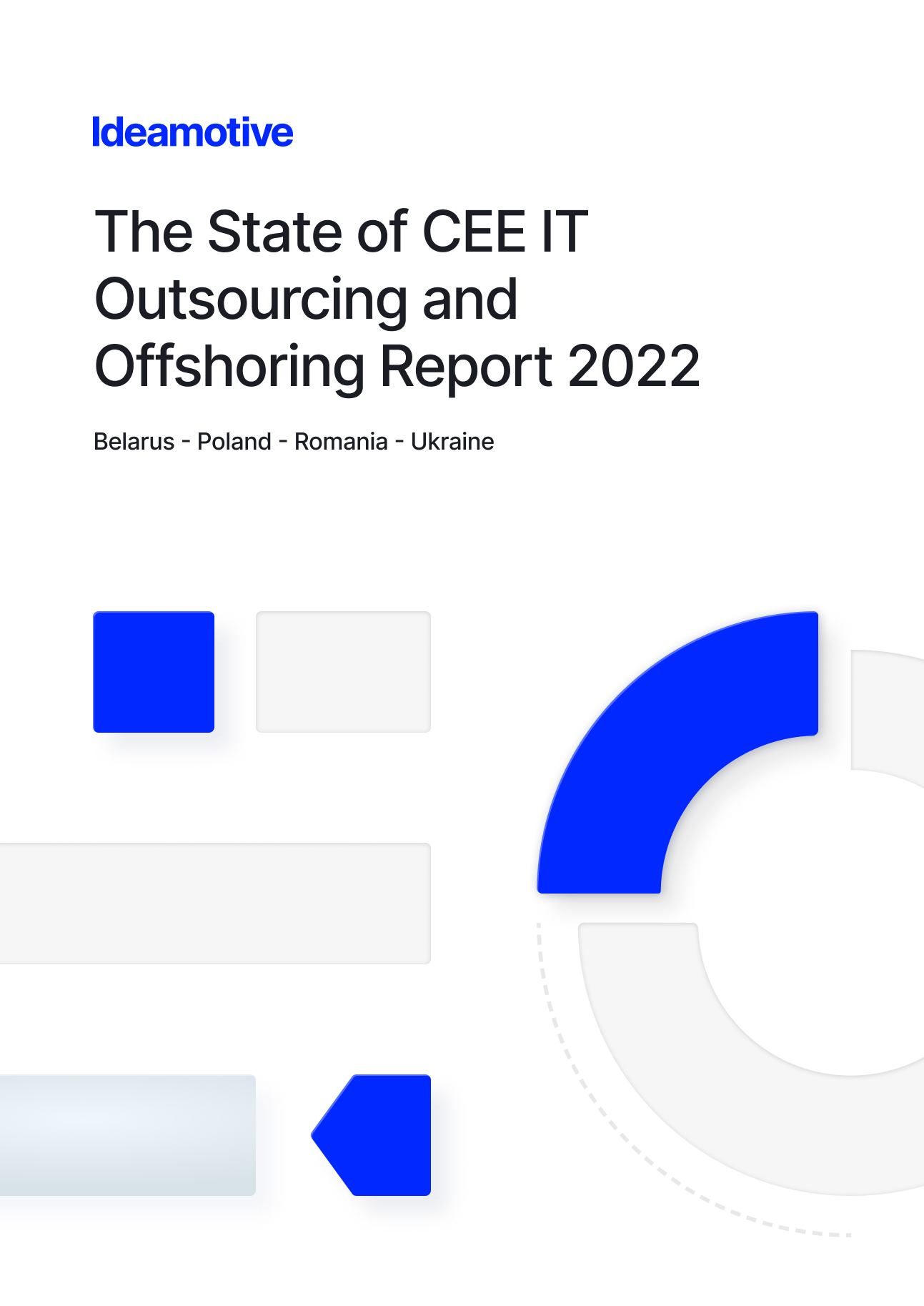
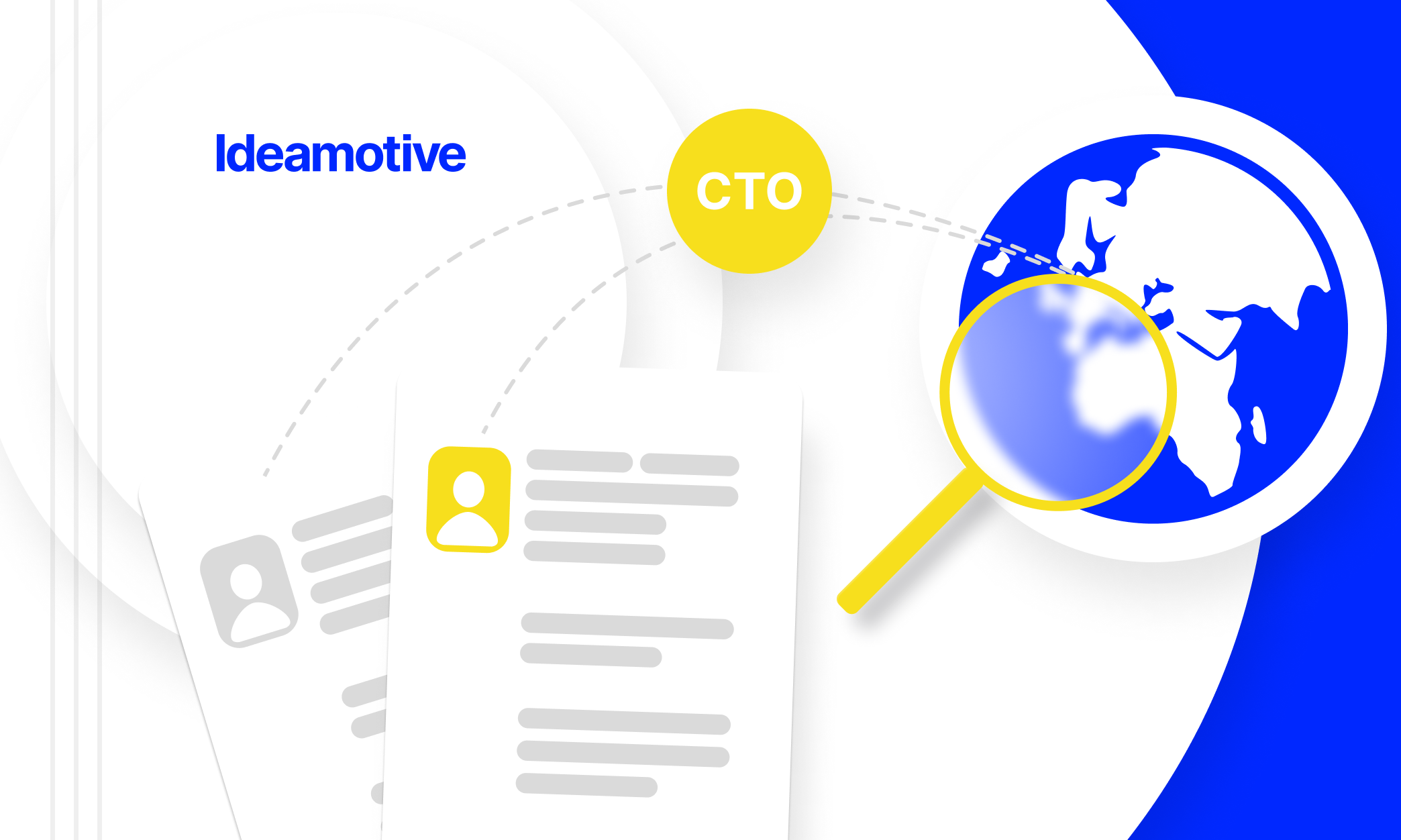
.png)



